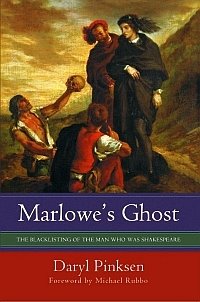
a question for Daryl Pinksen, author of Marlowe's Ghost
Originally posted on The Marlowe-Shakespeare Connection.
Carlo: Daryl, what do you say to those who argue that Marlowe's style differs from Shakespeare's? Thus, the argument goes, Marlowe could not have authored the plays we attribute to Shakespeare.
Daryl: Thanks, Carlo. They do have a point, the mature Shakespeare style does differ substantially from Marlowe's, but here's the rub: the early Shakespeare style also differs substantially from the mature Shakespeare style. As a result, comparing Marlowe's style to the mature Shakespeare tells us little. Here is what we need to ask: are the styles of late Marlowe plays and early Shakespeare plays similar enough to suggest that they could have been written by the same person?
Many people don't realize that until the 1960's, it was common for scholars to argue that Marlowe co-authored early Shakespeare plays. As far back as 1886, scholar A.W. Verity said, "Among the plays assigned to Shakespeare there are four of which it is practically certain that Marlowe was a part author; they are of course, Henry VI, parts I, II and III, and Titus Andronicus." To many scholars' ears, early Shakespeare simply sounded too much like Marlowe to ignore. Assigning early Shakespeare plays wholesale to Marlowe was unacceptable, so they compromised by speculating that the early plays had been co-written by the two men. But things have changed since then. In the last several decades, these claims have nearly vanished from the literature.
Nonetheless, a survey of scholarship on Shakespeare and Marlowe dating back over a century confirms that the styles of the two bodies of work are closely related. Take this 2002 quote from a giant of Shakespearean scholarship, Harold Bloom, who said, "Marlowe . . . was Shakespeare's starting point, curiously difficult for the young Shakespeare to exorcise completely," adding, "that means the strongest writer known to us served a seven-year apprenticeship to Christopher Marlowe." So why is it that we continue to hear how different their styles are? I have a theory. . .
In undergraduate English programs, students read Hamlet, King Lear, Macbeth -- the mature Shakespeare masterpieces. If they are required to read a Marlowe play, it will likely be Dr. Faustus, the play most associated with Marlowe. Marlowe does not fare well in the comparison. The instructor will then guide students through a "compare and contrast" of the two playwrights' styles. Even the dullest student will easily see the differences between Shakespeare masterpieces and early Marlowe. For many students of English literature this will end their study of Shakespeare's contemporaries, and they will depart with the firm, albeit superficial, conviction that the styles of Marlowe and Shakespeare are markedly different, and dismiss anyone who suggests otherwise.
A more honest approach might lead to a very different conclusion. Dr. Faustus was written before 1588, when Marlowe was in his early 20's. Hamlet and Lear were written after 1600, when Marlowe would have been in his mid to late 30's. A fair comparison would examine plays written closer to the same time. If students were to begin their studies with an early Shakespeare play, like Richard II, and then read a late Marlowe play, like Edward II, plays separated by only a handful of years, they would find it hard to believe that they were written by different playwrights. Or imagine instead if students were to begin their Shakespeare studies by reading Hamlet (1600) followed immediately by Titus Andronicus (pre-1594). They might find it hard to reconcile the two plays as the product of a single author. Yet most accept that these two plays were written by the same person because we quite reasonably make allowances for writers to grow over a long career.
When we eliminate the variable of time, the styles of the Marlowe and Shakespeare plays are indistinguishable. Placed in chronological order, the plays suggest the continuous evolution of a single writer, the blacklisted accused heretic, Christopher Marlowe.
Visit the website here: www.MarlowesGhost.com
© DARYL PINKSEN 2008



No comments:
Post a Comment